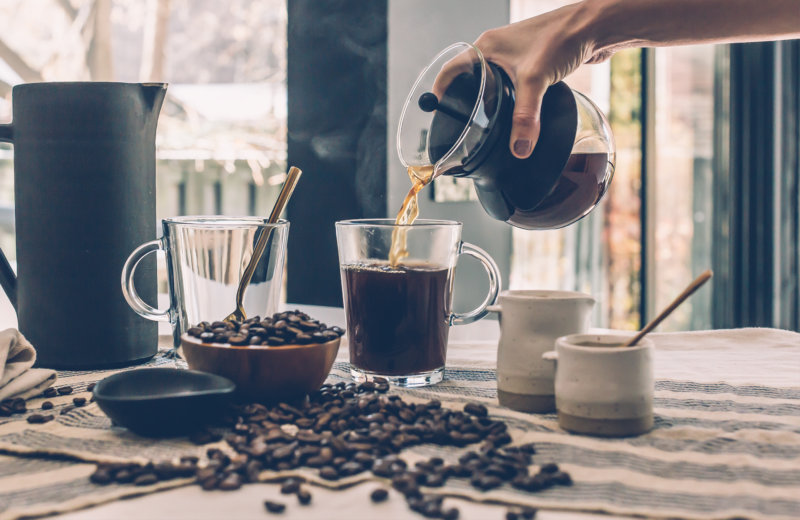There are some things out there that just feel like they were made to be together. For example, you have peanut butter and jelly, salt and pepper, chocolate and just about anything. While all of these are still great on their own, when you combine them with their counterpart, it is only going to help you enhance the other’s qualities. When it comes to nootropics, they can have a very similar type or relationship as well.
If you are able to get the perfect pairing of ingredients into your nootropic stack, it will help to enhance not just the effects of the ingredients, but it will also help to boost any of the cognitive benefits that you will be benefiting from as well. It’s almost like it is a match that was made in heaven, if a bright white laboratory counts as heaven. One of these ‘magical’ relationships is that of an alkaloid and an amino acid. In fact, this combination is almost like a Romeo and Juliet romance, it is just meant to be. But just in case you are familiar with Romeo and Juliet, rest assured that this partnership is not going to have any type of tragic ending. So which alkaloid and amino acid is this referring too? The answer to that is caffeine and l-theanine.
But before you can dive into the great combination of L-theanine and caffeine, you will first need to know what the best qualities of each ingredient is by itself. With that being said, here is everything that you will need to know about caffeine and L-theanine.
Caffeine
When you think of caffeine, the first thing that probably comes to your mind is coffee. In fact, you may even be drinking some coffee right now. A recent survey has revealed that roughly 64% of all Americans report drinking at least one cup of coffee each and every day. Caffeine though, can actually be found in over 60 different varieties of other plants, some of which include kola nuts, tea leaves, and even cocoa beans. When you take these natural versions of caffeine and add in some synthesized versions to it, you will get the wide-variety of caffeine medications and foods that you have available to you today. You can probably guess who the usual suspects are, those being energy drinks, soda, chocolate, and even some types of painkillers will contain small doses of caffeine as well.
While you shouldn’t let any of this keep you up all night, all you need to do is simply give the ingredients label a quick scan to see if an item has any caffeine in it.
Even if you do not use any type of caffeine in your regular daily routine, you are more than likely familiar with all the basics about caffeine. Caffeine is a type of crystalized compound that is naturally occurring and can also be synthesized in a laboratory setting. It works by stimulating your central nervous system as quickly as 15 minutes after it is consumed, which will in turn provide you with a nice little energy boost.
If you are consuming caffeine in order to get a little extra boost, the caffeine is going to have to inhibit certain actions within your brain. As you have countless neurons that are firing throughout your day, adenosine, a neurochemical, will begin to build up. This excess buildup of adenosine is going to reduce your amount of neuronal activity, which is one of the reasons why you may start to feel less alert. Since caffeine is the same exact shape and size of adenosine, it is able to mimic it, which will then prevent it from having any kind of interactions with neurons and slow down how active they are. It is this interaction that gives you that extra boost.
Whether you are drinking it in your coffee or not, when it comes to caffeine, it is a hot topic. While there are many benefits that are associated with caffeine, there are also many side effects as well.
Benefits of Caffeine:
Helps to boost your memory
Helps you to power through your workout
Increases your amount of focus and alertness
Side Effects of Caffeine
It can potentially cause irritability, insomnia, and even an upset stomach
Can increase your anxiety levels
Can cause you to have jitters
Now that you are familiar with caffeine, here is everything that you will need to know about L-theanine in regard to an individual ingredient.
L-Theanine
L-theanine is one of the non-protein amino acids that helps to supply all of the delicious umami flavor you get when you drink either black or green teas.
L-theanine is praised for its ability to help reduce your physiological stress response, as it imitates the same actions of GABA (gamma-aminobutyric acid), which is an inhibitory neurotransmitter that works by blocking your excitatory responses in your brain. On top of that, L-theanine is also able to suppress your excitatory glutamatergic receptor functions. When your excitatory responses have been inhibited, L-theanine is able to lower your heart rate, stress hormone levels, and your blood pressure as well. This all means that when you are able to reduce these particular responses, you are going to see an overall reduction in regard to your anxiety and stress levels.
When you are winding it down, L-theanine is able to help your brain to generate the alpha brain waves which have been proven to be associated with relaxing and relaxing activities, such as meditation or daydreaming. Are you already fully relaxed? L-theanine has a prolonged calming effect that can help you to taking that final step towards falling asleep. This is exactly the reason why some forms of sleep aids have started using L-theanine in their ingredients.
What makes L-theanine so interesting, is that it actually works on both sides of your sleep cycle. After you have woken up from sleeping, you can take some L-theanine to help you start your day off with laser-like focus. In fact, in a recent study, human test subjects performed exceptionally better when it came to attention-based tasks after they had supplemented with some form of L-theanine.
Now that you know all about caffeine and L-theanine, here are the secrets to their relationship.
L-theanine and Caffeine
As mentioned earlier, some of caffeine’s side effects include restlessness, anxiety, and even potentially increased blood pressure. L-theanine on the other hand, works to help combat these side-effects, making caffeine much easier to deal with.
In essence, caffeine is going to inhibit adenosine receptors from taking action inside your brain, which is considered to be stimulatory activity. Now you have L-theanine, which is able to help reduce your physiological responses to excess stress by inhibiting the excitatory responses that take place in the brain.
What all of this means, is that with L-theanine, you can enjoy he brain boosting benefits that comes with caffeine, but without a rise in your blood pressure or feeling any type of anxiety.
Caffeine is considered to be a vasoconstrictor. This means that it will temporarily cause your blood vessels to become smaller, which in turn will raise your blood pressure to make up for the reduced blood flow. L-theanine will eliminate caffeine’s ability to vasoconstrict so that you can start focusing on something that isn’t the sound of your blood pumping in your ears.
If you are someone who isn’t able to focus because of the crash that you feel after consuming caffeine, L-theanine will be able to help you out with that. A study that was done in 2008 reported that subjects had fewer headaches and felt more energetic when mixed in with caffeine, as opposed to just caffeine by itself.
While taking caffeine and L-theanine together has many great benefits, the combination is not without its share of side effects too. There can be times where the two will simply not be in sync with each other.
For example, alertness. In some certain cases, there will be no real significant increase in your subjective alertness. Similarly, caffeine and L-theanine did not actually deliver when it came to their natural chemistry in monotonous and prolonged tasks that required the test subject’s constant attention. The same thing happened when in regard to mood modifications, meaning that the subject’s mood remained unfazed.
While there are several different theories on why this happens on occasion, the best explanation is that L-theanine modulates caffeine’s stimulatory effects, meaning that it has the potential to mitigate all of caffeine’s cognitive benefits. This possibility of reducing caffeine’s stimulatory effects can actually be amplified even more if you are a habitual caffeine user, as you will have already lost most of your sensitivity to it.
When it comes to L-theanine and caffeine, it is a great way to get all of the benefits of caffeine, but without any of the side effects. So if you like what coffee does for you, but don’t like what happens after your ‘caffeine high’ wears off, try adding some L-theanine to it and good things should happen.

